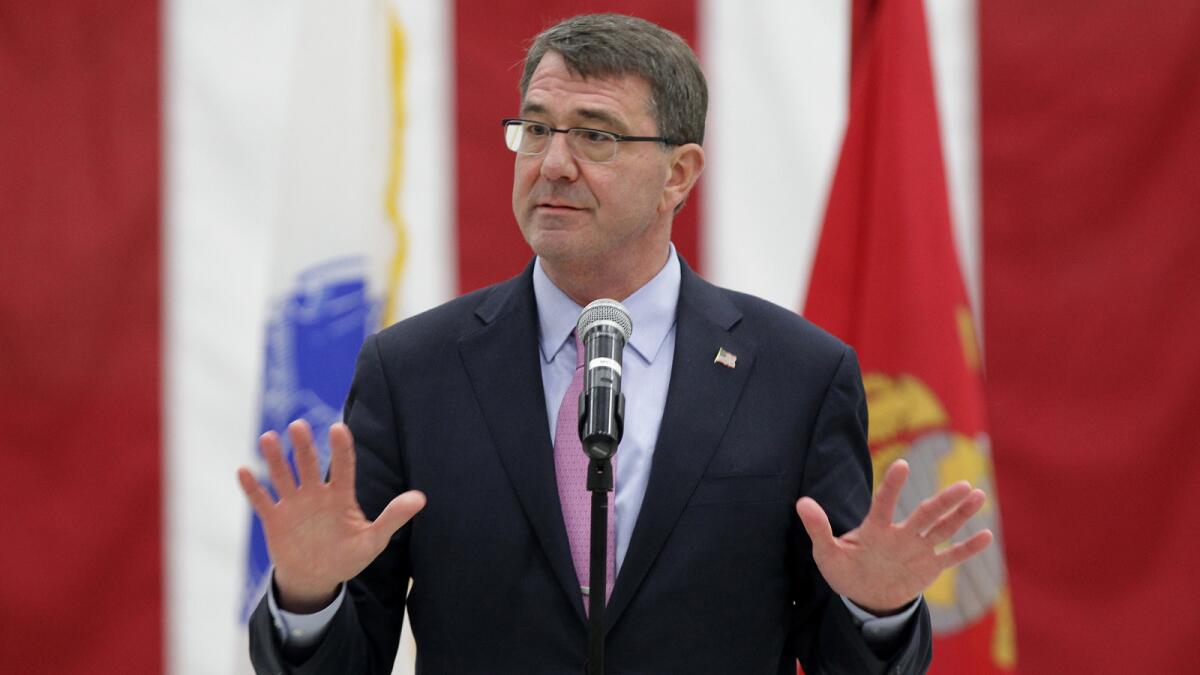What will it take for Silicon Valley to work with the Pentagon?

Defense Secretary Ashton Carter’s visit to Silicon Valley this week is a source of pride for the technology industry, a recognition of sorts of the broad impact that companies such as Facebook, Google and even tiny start-ups are having on Americans' lives.
But his tour of the region Thursday and Friday alone won’t help ease the testy relationship between the nation’s defense agencies and the tech industry. He’s counting on a series of new initiatives that he announced Thursday morning during a speech at Stanford University to do that. But venture capitalists and others with ties to the tech industry say there are other steps the federal government must take in the months to come to ensure cooperation between the makers of gadgets and apps and potentially one of their biggest customers:
Renew trust
"Through successes and strains, our ties have broadly endured, but I believe we must renew the bonds of trust and rebuild the bridge between the Pentagon and Silicon Valley."
-- Ashton Carter, Secretary of Defense
Let go of ego
“The security of our country is bigger than any of our egos. All the parties need to grow up or mature, but in the end good fences make good neighbors.
“The U.S. has always been a place where you know what the rules are. They have to remain the one place in the world where the rules are followed. That credibility has been impacted [by the Edward Snowden revelations], and we need to win that back with the world. The U.S. government must follow clear rules.”
-- Venky Ganesan, managing director of the venture capital firm Menlo Ventures
Breed cross-pollination
“The two reasons [Carter’s] out here are trust building and to capitalize on the innovation. It’s a realization, ‘I need to tap into innovation to stay ahead of my adversary.’ National security is only going to work when we get the brightest minds in the public sector and private sector working together. They are going to spend meaningful dollars in defending the United States, and we can be a part of that.
“One of my portfolio companies -- Evident.io – they are thinking about how can they work with the CIA moving to private cloud servers. Evident sees that as an opportunity, so they are investing time in working with the intelligence community. Now, it’s a matter of how do they work with us even more.
“There’s a great example of what Carter is trying to do at Shape Security. The founder, Derek Smith, sold a company to Raytheon and then went to work for the Department of Defense and then came back to found Shape Security. I love the idea of going back and forth, the notion of cross-pollination between government and the private sector. It creates a better understanding of what the other side is trying to do and through that you know why people are asking certain questions.”
-- Enrique Salem, managing director at Bain Capital Ventures, former chief executive of Symantec Corp. and member of President Obama's management advisory board
Count on private industry to be more cutting-edge
“If there’s a working relationship between the government and the private sector, then the issue of protecting our own security while developing new markets can be a part of the discussion. That’s why it makes sense to open these lines of communication.
“I think that the basis for that was that there was a mutual sense that to be able to develop the kind of capabilities that we needed to be able to be on the cutting-edge, that there was no way the government would be able to do it on its own.
“Primarily, the focus [of companies] is on the private marketplace. But they also know the defense industry and the government will be very interested. From a company’s point of view, it’s a win-win situation. ”
-- Leon Panetta, former Defense secretary and CIA chief
Increase agility
“We need the Pentagon, NSA, CIA, FBI, DHS and other government agencies to setup direct relationship with start-ups by having business development organizations, technologists and labs to test and evaluate software and hardware products.
“The technology change in cloud, Big Data and security is going through the trend of Moore’s law for innovation – every 18 months there are a new generation products and architectures. Government agencies need to increase agility in reacting to cyber threats by working closely with innovation out of Silicon Valley.”
-- Muddu Sudhakar, chief executive of Caspida, a start-up that develops programs to spot computer security threats
MORE
Pentagon seeks to shed 'dreary' image to attract Silicon Valley talent
For more on technology news, follow me @peard33 on Twitter.UPDATE
4:51 p.m.: This article has been updated with a quote from Caspida.
4:30 p.m.: This article has been updated with additional quotes throughout.
This article was originally published at 3:33 p.m.




